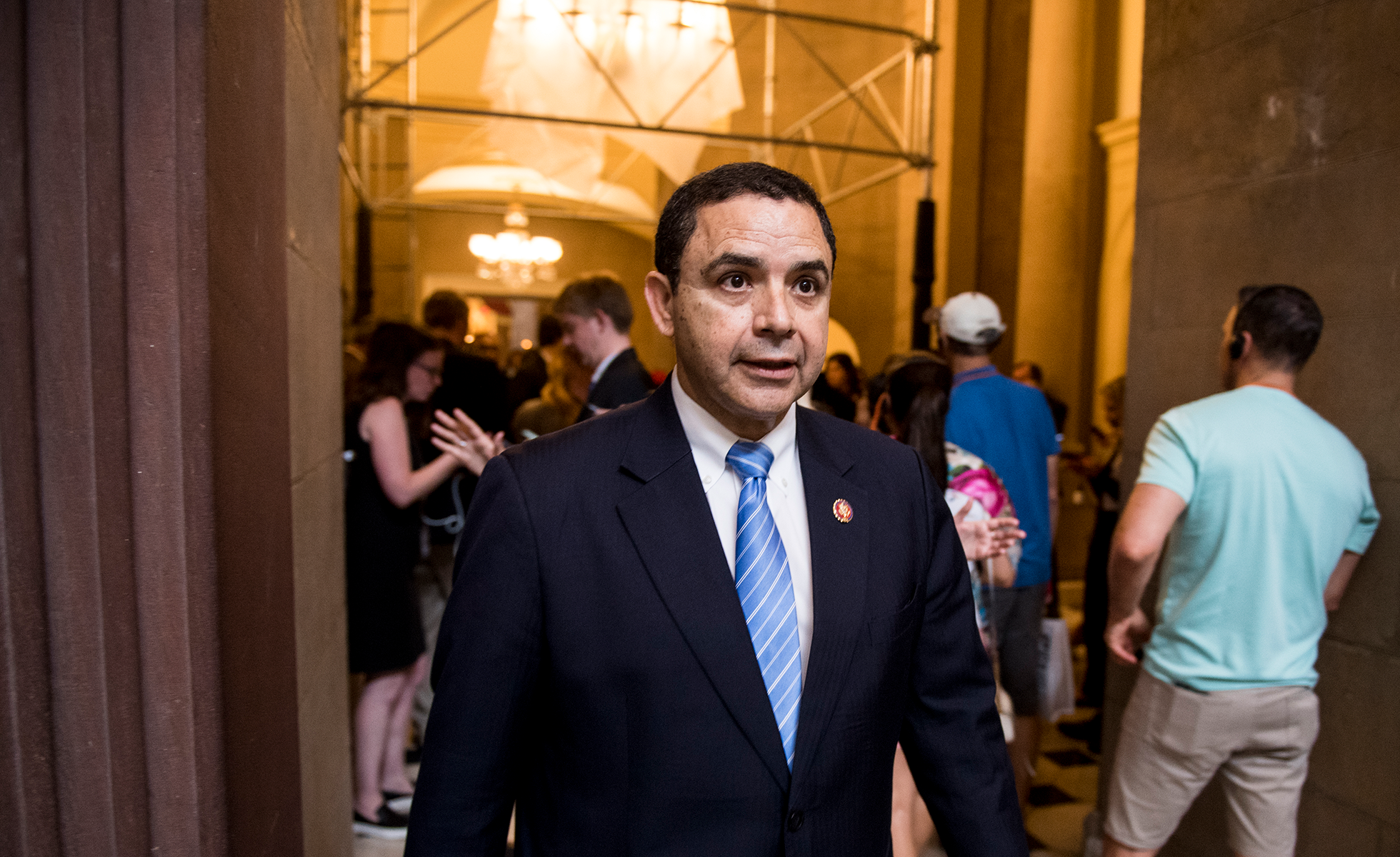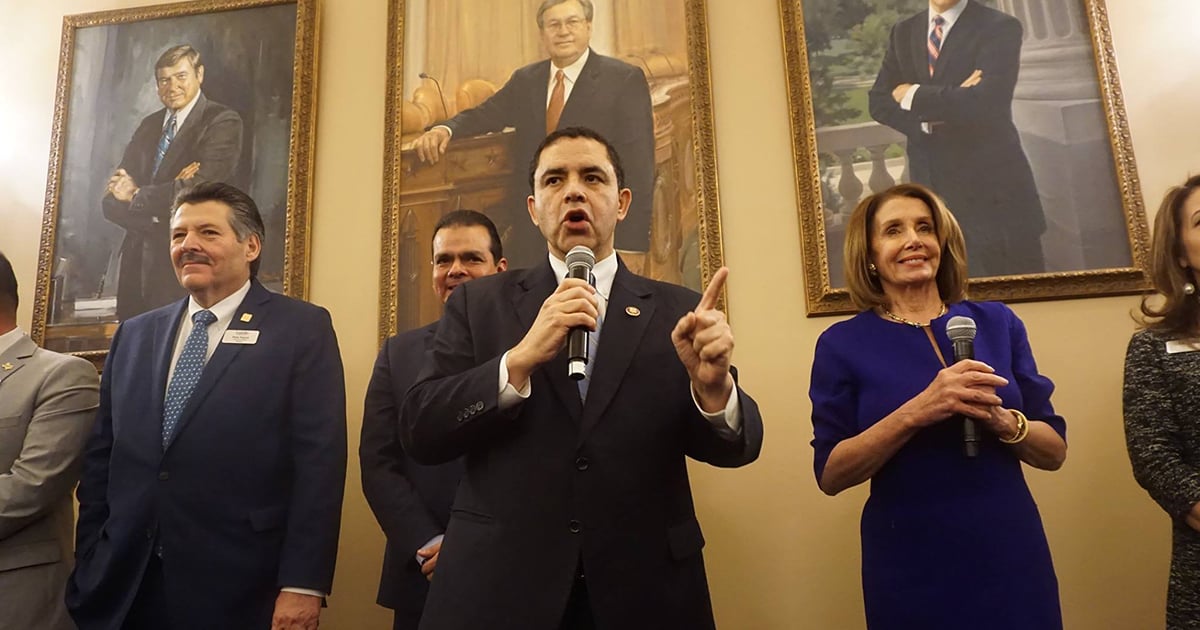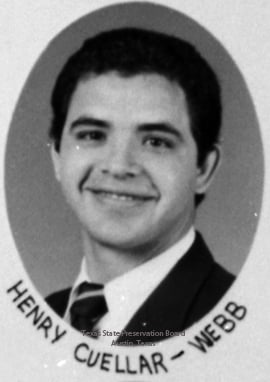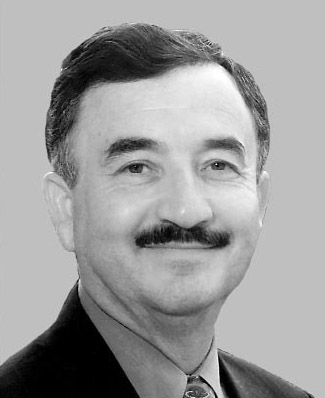
The Party Pariah
How Henry Cuellar rose to power—and how he intends to stay there.
*
by Justin Miller
February 28, 2020
Over the course of his nearly 35 years as a politician, Henry Cuellar has managed to piss off just about every part of the Democratic coalition. He’s a pro-gun, anti-abortion, anti-union deficit hawk who has rarely met a regulation he wouldn’t gut or a Republican he wouldn’t work with. As a U.S. representative, Cuellar was first an ally to President George W. Bush, then a thorn in the side of the Obama administration. He’s voted in line with President Trump’s agenda more than all but two other House Democrats, according to FiveThirtyEight. Critics have painted him as nothing more than a Republican in a Democrat’s clothes.
And yet, as a high-profile primary challenger blasts Cueller as “Trump’s favorite Democrat,” the Blue Dog Democrat from Laredo has an improbable longtime ally beside him: Speaker of the House Nancy Pelosi, the icon of San Francisco liberalism.
This past weekend, Cuellar was in his hometown for the border city’s biggest celebration, George Washington’s birthday, with Pelosi in tow. Early voting was underway as the 15-year incumbent in Texas’ 28th Congressional District worked to ensure he doesn’t fall to his first real challenger in over a decade: Jessica Cisneros, a young immigration attorney supported by a battalion of national progressive groups.
“We want this to be not only a victory, but a resounding victory for Henry Cuellar,” Pelosi told a crowd gathered at his campaign headquarters. She has a lot riding on his survival. Pelosi has long argued that if Democrats want to control the House, they must include moderate and conservative members of the party as well as progressives. Now that idea is under siege. In 2018, underdog Alexandria Ocasio-Cortez successfully took out incumbent Joe Crowley, the heir apparent for speaker of the House. If an organized insurrection from the left succeeds in defeating one of Pelosi’s top allies for a second consecutive cycle, she and the rest of the old-guard Democrats could be imperiled.

Riding off of their success in 2018, Justice Democrats, the group responsible for propelling Ocasio-Cortez to victory, set out to take on more establishment incumbents. More than a year ago, they tagged Cuellar as their top 2020 target. It was a logical pick. One of the leaders of the conservative Blue Dog Coalition, Cuellar has been backed by the National Rifle Association. He sustains himself on gobs of contributions from corporate PACs and big donors with interests in his district, including the oil and gas giants who frack the Eagle Ford Shale and private prison companies like GEO Group.
But Cuellar has also become a critical member of Pelosi’s leadership team in the House, and he’s one of the party’s most prolific fundraisers. In 2012, Pelosi appointed him as the sole Texas Democrat on the powerful Appropriations Committee. He’s also been her top liaison to the Trump administration on border matters and the recently enacted new trade deal.
“We have a good working relationship,” Cuellar tells the Observer. “She understands that if she’s going to be the speaker, she cannot just rely on progressives, because there’s not 218 progressives [in the House].”
The 28th Congressional District, which jaggedly stretches from the outskirts of San Antonio to the U.S.-Mexico border, is predominantly Hispanic. The 28th is also a solid Democratic seat that Hillary Clinton won by more than 20 percentage points. Cuellar has faced Republican opposition in the general election only three times since 2010, easily trouncing his challengers each time.
Cuellar contends that his voting record is reflective of Democratic voters in South Texas—typically a more conservative breed. “There are national people that feel that if it’s a Hispanic district, then you have to be a liberal. And if you’re not a liberal, there’s something wrong with you,” Cuellar says. “But if you understand the Hispanic culture, in many ways it’s conservative.” While Democrats have become more liberal elsewhere in Texas, Laredo and the rest of the South Texas border still elect some of the state’s most right-leaning Dems. Trade, oil and gas exploration, and the hulking border security apparatus are all major economic drivers that provide good-paying jobs.
But the rates of people living in poverty or without health insurance—around 30 percent for both—are among the highest in the state. Like Cuellar, his challenger Cisneros was born and raised in Laredo and is a first-generation Mexican American. There’s a reason, Cisneros says, that voter turnout in Laredo is also among the state’s lowest. People don’t bother to vote when it’s become clear that the political system isn’t working for them. Her bet is that South Texans would be open to a more aspirational, ambitious, progressive approach to politics if they were just given the option.

Cisneros interned in Cuellar’s Washington office before getting her law degree from the University of Texas at Austin. She says she decided to take on her former boss because she saw firsthand that Cuellar was out of touch with his constituents, selling out their needs to gain special-interest donors. She cut short a fellowship as an immigration attorney in New York City and moved back home, launching her campaign in June.
The race is one of most-watched primaries in the nation, frequently drawing comparisons to Ocasio-Cortez’s upset. Cisneros has embraced a progressive platform—Medicare for All, the Green New Deal, immigrant rights, and tuition-free college—that stands in stark relief to Cuellar’s record.
So though Pelosi is in the uncomfortable position of supporting an anti-abortion incumbent who just became the first Democrat to receive an endorsement from the Koch brothers’ political network, she has not withered in her loyalty. This time around, the party is taking seriously the threat of crusading progressives. “We assume that Henry will win, but we don’t take anything for granted,” Pelosi told the crowd in Laredo. “The word ‘assume’—ass of you and me. Assume nothing.”
It seems like a minor miracle that Cuellar has managed to survive in Democratic politics for this long, but he has proven himself resilient. An ambitious—some would say conniving—politician from the start, Cuellar fought hard to become the congressman from Laredo. And despite creating plenty of embittered rivalries and partisan vitriol along the way, his hold on the Texas 28th has only tightened in the 15 years he’s held the seat. He’s determined not to let a progressive insurgency pry it from him.
*
The oldest of eight children born to Mexican migrant farmworkers, Cuellar has the classic bootstrap story. He earned his associate’s degree at Laredo Community college—the first of five degrees he accumulated over the years, including a law degree and Ph.D.—and started his own law firm and became a trade broker. He proudly refers to himself as the “most degreed member of Congress.”
Cuellar turned his gaze toward politics in the mid-1980s, just as Laredo was on its way to becoming a major hub for U.S.-Mexico trade. As the city grew, its power structure changed. For nearly a century, a political machine called the Independent Club—or Partido Viejo—controlled governments in Laredo and Webb County, trading patronage for votes. But it crumbled under the weight of its own corruption in the late 1970s.
Cuellar launched his political career in this new landscape, winning a seat in the Texas House in 1986. Over the 14 years that he served as Laredo’s state representative, Cuellar consolidated support from the region’s influential families and wealthy businessmen while making himself a household name in the border outpost.

“Henry pushes the right buttons. He knows the right people,” says Jerry Thompson, a history professor at Texas A&M International University in Laredo. “He is the consummate politician.”
In the Texas Legislature, Cuellar championed college affordability and the colonias, both big issues in Laredo, but also supported then-governor George W. Bush, who he eventually backed for president, on conservative priorities like school vouchers and tort reform. His willingness to reach across the aisle landed him a position as Texas secretary of state under Rick Perry.
Many Texas Democrats saw him as a sellout, willing to put his own ambitions over those of his party. So by the time that Cuellar unexpectedly stepped down as secretary of state and launched his bid for Republican Henry Bonilla’s U.S. House seat in 2002, many Democrats were wary. Cuellar’s narrow loss in Texas’ 23rd Congressional District prompted sniping from many Texas Democrats who thought he botched a winnable race. An anonymous Democratic operative put the word out in Washington that Cuellar “was a fundamentally and fatally flawed candidate.”
Undeterred, Cuellar began plotting his own path to power. The GOP had just completed its state takeover by winning the Texas House in 2002, and Tom DeLay was executing his ruthless plot to wipe out Democrats’ congressional majority in the Lone Star State. In 2003, DeLay and state Republicans redrew the Texas congressional map in a way that would undercut some of the state’s most powerful and longest-serving Democratic members of Congress.
But Cuellar came out ahead. Behind the scenes, he had lobbied a former Republican colleague to create a congressional district that included his base in Laredo. As court testimony would later show, GOP state Representative Phil King, the chair of the House Redistricting Committee, eagerly helped his old pal. In a deposition, King said that Cuellar spoke with him often as districts were being carved up, telling King that “my political base is Laredo, and—and if I’m going to run for Congress, that’s where I need to be.” As King, his former state House colleague, put it, “Henry is a friend, and I like him, and he knew I’d listen to what he said.” The final map cut Webb County in half along Interstate-35, putting most of Laredo (save for some wealthy pockets) in the dramatically redrawn 28th, held by Representative Ciro Rodriguez of San Antonio, the head of the Congressional Hispanic Caucus.
Cuellar decided it was time to make a move, and he launched a primary challenge against Rodriguez. Even though he still lived in a slice of Laredo in Bonilla’s district, he figured it’d be easier to take on Rodriguez, an old friend from the Texas Legislature who had gone out of his way to help with Cuellar’s 2002 campaign. Democrats saw this as beyond the pale.
“He basically sold out half a dozen Democrats to get something he wanted,” says Texas Democratic operative and fervent Cuellar critic Matt Angle.
The DeLay map marked a turning point in Texas politics, solidifying the GOP’s hold on the state and hastening the demise of the state Democratic Party. Cuellar denied allegations that he conspired with Republicans, insisting that the GOP redrew the lines to protect Bonilla from a rematch with him. Regardless, Rodriguez saw it as a clear betrayal. “The first time I heard about [his decision], I thought, ‘No, it can’t be,” Rodriguez said at the time. But Cuellar was unrepentant: “Nobody died and made him king,” he tells the Observer. “Democrats run against Democrats all the time, and that’s what it’s all about.”
While Cuellar may have been viewed as a turncoat by plenty of Democrats, many in Laredo were eager to have their first hometown congressman in 20 years. Laredo was becoming a verifiable boomtown thanks to its lucrative trade and energy industries, and business leaders wanted a champion in Congress.

Cuellar, who had nurtured relationships with the region’s power brokers and business elite for nearly 20 years, was the perfect fit. As he ramped up his primary campaign, he tapped into a ready-made coalition of Webb County’s bankers, ranchers, oil and gas barons, and trading moguls who eagerly pumped hundreds of thousands of dollars into his coffers. Cuellar said he was better equipped to represent the new district and often quipped on the trail that “Ciro has done zero.”
Rodriguez won by a razor-thin margin of 145 votes, but Cuellar demanded a recount. Election officials found nearly 500 new votes in Webb County and neighboring Zapata—enough to swing the election in Cuellar’s favor. The batch of new votes immediately prompted suspicions of vote tampering, evoking comparisons to the infamous “Box 13” ballot-stuffing scandal in South Texas that helped Lyndon Johnson win his 1948 Senate race. “There is no way on God’s green earth that 177 ballots showed up for Cuellar [in Webb County] and zero for Rodriguez,” Cal Jillson, a political science professor at Southern Methodist University, said at the time. “You have to look at this as one that will go down in Texas lore as a stolen election.”
Cuellar’s campaign declared victory. Rodriguez filed a lawsuit alleging voter fraud, which the courts eventually shot down. When all was said and done, Cuellar had eked his way into Congress by a margin of 58 votes.
Laredo had itself a congressman.
*
Cuellar quickly became the target of a coordinated effort in Washington to knock him out of office after just one term. He joined Republicans repeatedly in support of Bush’s political agenda, including his push to privatize Social Security. His aggressive lobbying for the Central America Free Trade Agreement (CAFTA)—which has had disastrous outcomes for Central America and the United States alike—provoked fervent backlash within his own party. By the time he was up for reelection in 2006, Cuellar had voted with Republicans more than all but nine of his Democratic colleagues in the House.
Rodriguez mounted a comeback campaign for his old seat and found eager allies among the party’s growing progressive base. Bush’s 2004 reelection had spurred a rise in internet activism, led by fledgling liberal blogs like DailyKos and groups like MoveOn and Democracy for America. These new “netroots” sought to push the party to the left, in part by ousting members of Congress who broke from the party line. Cuellar soon became their bête noire, especially after he made headlines at the 2006 State of the Union address: As President Bush made his way through the House floor, he enthusiastically embraced Cuellar like a long-lost friend, cupping his cheeks as the congressman beamed. The moment was captured by a photographer and prompted a surge of online donations to Rodriguez, who plastered the photo on campaign material.
The primary race—and Cuellar’s controversial voting record—quickly became a daily obsession on the increasingly influential liberal blogosphere, which raised hundreds of thousands of dollars for Rodriguez’s campaign. Labor unions, trial lawyers, reproductive rights groups, and environmental advocates all spent big money going after Cuellar. Fifteen Democratic members of Congress even bucked party decorum by openly supporting and contributing to Rodriguez’s campaign.
To fend off his well-funded opposition, Cuellar turned to his wealthy donors in the 28th, supplementing his war chest with PAC checks from conservative benefactors such as Koch Industries and the National Rifle Association. He became the first Democrat to receive an endorsement from the right-wing Club for Growth, which spent more than $100,000 on his behalf.
Despite the widespread national support, Rodriguez ran a lackluster campaign and failed to turn out his political base on San Antonio’s south side. Cuellar easily won the three-way race, pulling in 53 percent of the vote to Rodriguez’s 40 percent.
“It’s not every day that a Democrat in a primary goes up against labor, trial lawyers, environmentalists, and bloggers and wins,” Colin Strother, Cuellar’s longtime campaign operative, told a reporter on election night. “You know, if you look at all the forces gathered against Henry, this is more than a victory. This is a really, really big victory.”
Cuellar had survived the full firepower of the liberals, disproving their belief that his moderate ideology and coziness with Bush’s Republican Party would be politically fatal. The win only increased his faith in his Blue Dog beliefs and his unique understanding of the 28th Congressional District. Now, those convictions are being tested again.
*
Cuellar hasn’t faced any real political opposition since his race against Rodriguez, which has allowed him to focus on building his political machine. In 2008, he helped his younger brother Martin pull off a narrow ouster of the incumbent Webb County sheriff, who got crosswise with the congressman over border security in a live segment on CNN. The two brothers have since worked closely together to secure tens of millions in new federal funds. The congressman’s sister Rosie recently ascended from a municipal judgeship to become the county tax collector-assessor.
The power of the Cuellar empire is on full display heading into Election Day. All three siblings are on the ballot, and their campaign signs are plastered in triplicate all over Laredo, dwarfing the presence of Cisneros’ magenta campaign signs. Cuellar’s team has framed Cisneros as a Trojan Horse candidate controlled by New York socialists who want to take down their hometown hero. Cisneros “is the puppet of Ocasio. That’s who’s pushing [her campaign],” Sheriff Martin Cuellar told me in December at a campaign event last December. “We know that’s what she’s doing. She’s just a little puppet, that’s all it is.”
In early January, Cuellar showed up for an interview at a Starbucks near downtown San Antonio with an entourage in tow. “We’ve seen this before,” he says, referring to his 2006 face off against Rodriguez.
Cuellar and his campaign team carry themselves with a level of bravado that borders on hubris, self-assuredly dismissing Cisneros’ challenge as an unserious, delusional gambit. Still, he has no intention of becoming the next Crowley. Although he has resisted Cisneros’ calls for a debate (”Am I going to give somebody free publicity?”) he is running a full-on campaign and showing his face in every corner of the district. When we met, he’d just come from a press conference touting a new initiative that he lobbied for in the latest defense spending bill that could bring millions of dollars to Military City USA.
“If you would look at what I get done in the appropriations, literally it’s about this thick of riders, money increases, or language that we added,” he says, holding his thumb and index finger a couple inches apart. In recent months, Cuellar’s congressional office has pumped out a steady stream of press releases playing up his role in securing federal program money all across the district: tens of millions of dollars from the Department of Homeland Security to fund border counties’ law enforcement operation; $18 million to help finance a new overpass in Laredo; nearly $70 million in additional funding for “Hispanic Serving Institutions” in the public schools system; $266,000 for the Webb County Sheriff’s Office and the Laredo Police Department; $4 million for infrastructure improvements at the city’s airport (Cuellar has a knack for getting money to the airport). The list goes on.

Even his most ardent critics will concede that he has been extremely effective in providing for his district. Since he was first elected, Cuellar has directed staff to hold monthly visits with officials in each of the district’s 45 cities to discuss their local needs. “When I come back, I run like if I’m a mayor. ‘Hey, what are your water needs? What are your infrastructure [needs]? What are the highway dollars [you need]?’ And I try to address those issues,” Cuellar says. “People remember that, what you’ve been delivering.”
This sort of political concierge service has earned Cuellar a deep and loyal network, particularly in Laredo and Webb County. There is nary a politician or local official in the district who would utter a critical word about their congressman. While Cisneros has been rolling out an endless number of high-profile endorsements from national politicians and organizations, Cuellar has flexed his muscle with a list of more than 220 elected officials in the district who have endorsed him. Not a single one has risked publicly stepping out for Cisneros.
“He handles the casework and gravy part of his district in such a way that it’s very difficult to beat him, particularly with an ideological challenge,” says George Shipley, a Democratic consultant who has worked on races in South Texas.
A master of public relations, Cuellar never misses an opportunity to turn a line-item appropriation into a photo op, grinning as he stands next to local officials with a giant check. These events amplify his image as the guy who brings home the bacon, even when his role in securing the money isn’t always clear.
“There’s an entire generation of us in the Texas 28th that thought that being a congressperson meant showing up to places with a giant blank erasable check,” Cisneros told the Observer. For young Laredo natives like her, the photo ops and ribbon cuttings with powerful people made politics feel inaccessible. “Now we’re older and more aware that it’s not that, but actually fighting to be a true representative for your community. Obviously, that’s what pushed us to drop what we were doing and decide to launch this primary challenge.”
Her campaign marks the first real test of Cuellar’s transactional approach to politics and relative conservatism. Is the longtime incumbent as in tune with district as he claims, or are people fed up with his years of catering to special interests?
Most of the South Texas political observers I’ve spoken to have been skeptical that an ideological challenge with a nationalized platform will break through against a popular and influential incumbent. Unlike more liberal Democratic cities in Texas, there isn’t much of a progressive base outside the party structure for a challenger from the left to tap into. As one Democratic operative put it, “I don’t see this community as ready to lose their seat at the table over a national political argument.”
While Cisneros is now a political phenom and Cuellar a villain at the national level, the dynamic is different in the district.
“This race has a lot of national attention and hype and money and big names, but it looks a lot different on the ground,” says Sergio Mora, a former chair of the Webb County Democratic Party. “[Cisneros’ campaign] has everything except the homegrown momentum.” The palpable excitement, crowded events, and campaign signs in rows of houses haven’t materialized, he says.
Stepping out against the Cuellars can be a risk for local Democrats. “I’ve had people tell me to be careful, that you won’t have a political career down the road,” says Amber Avis, president of the Webb County Young Democrats chapter, one of the only local Democratic groups that has endorsed Cisneros. “I just felt like this was so much more important.”
Avis thinks the race could be close, pointing to a substantial segment of people “who are sick of all the Cuellars.” But she doesn’t discount the power of Cuellar and the political establishment. “The devil works hard, but Henry Cuellar works harder.”
The primary battle has heated up in the homestretch. Both sides have gone on the offensive, each bolstered by significant sums of outside spending from allied groups—a sign that it may be a close race. EMILY’s List has backed Cisneros, launching a super PAC that has spent more than $1 million, and a coalition of labor unions and the Texas Organizing Project is funding a canvassing operation. Although Cisneros has outraised the incumbent in the past two quarters, Cuellar still has a mountain of campaign cash, and he’s called in favors owed from powerful friends. The U.S. Chamber of Commerce, the Koch brothers, the American Banking Association, and a mysterious dark-money group are all spending big money on his behalf.
And yet, with all the money and attention in the race and a huge presidential primary, early turnout has still lagged in Webb County.
Even as the national progressive puissance is aimed at Cuellar, he remains confident that the strength of his support throughout the district will prevail. To him, the incessant attention devoted to the growing cadre of progressives—namely Ocasio-Cortez, who endorsed Cisneros—has created an alternate reality in which the Democratic Party’s center of gravity is lurching leftward.
One person doesn’t change the whole Democratic Party, Cuellar says. Whenever he’s asked about his party bona fides, he turns to money. He is always the first to pay his dues to the DCCC, he says, and spreads the funds he’s raised from all the corporate PACs to his colleagues. Ocasio-Cortez, meanwhile, recently said she’s withholding her party dues because of myriad grievances with Democratic leadership. “I’ve told some of my progressive [colleagues], if you’re going to complain, pay your dues and then talk to me,” Cuellar says.
As he sees it, Cuellar has paid in full.
Read more from the Observer:
-
Texas Prisons Ban Greeting Cards, Expand Drug-Sniffing Dog Searches to Visitors: Families of prisoners and civil rights groups call the new policies arbitrary, punitive, and isolating for people behind bars.
-
In the Trump Era, Practicing Immigration Law is Like ‘Swimming in Molasses’: Veteran attorney Elise Harriger is learning how to lose, but she vows to keep on fighting.
-
In Southeast Lubbock Neighborhood, Residents are Fed Up With a Feedlot: Kathy Stewart has complained for years about the fecal dust invading Yellowhouse Canyon. But so far, her concerns have mostly been ignored.







